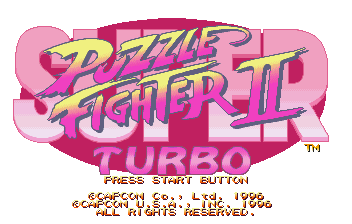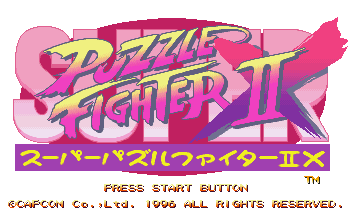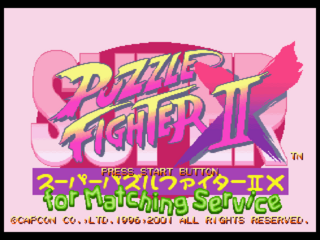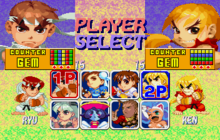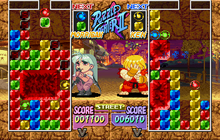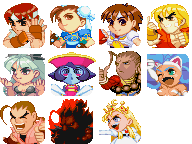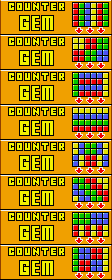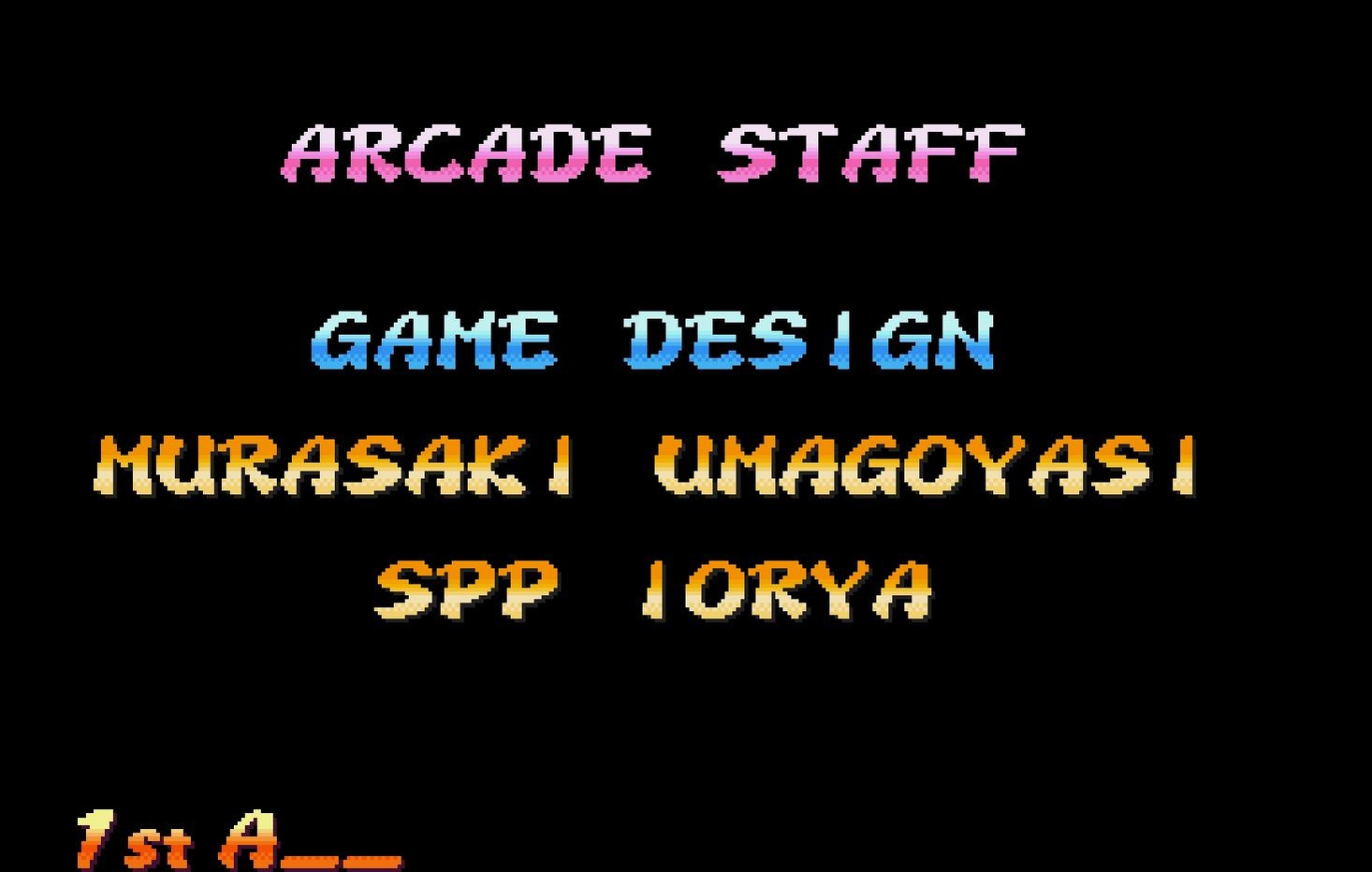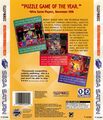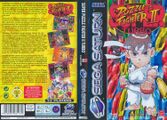Super Puzzle Fighter II Turbo
From Sega Retro
| Super Puzzle Fighter II Turbo | ||||||||||||||||||||||||||||||||||||||||||||||||||
|---|---|---|---|---|---|---|---|---|---|---|---|---|---|---|---|---|---|---|---|---|---|---|---|---|---|---|---|---|---|---|---|---|---|---|---|---|---|---|---|---|---|---|---|---|---|---|---|---|---|---|
| System(s): Sega Saturn, Sega Dreamcast | ||||||||||||||||||||||||||||||||||||||||||||||||||
| Publisher: Capcom (JP) Capcom Entertainment (US) Virgin Interactive Entertainment (Europe) | ||||||||||||||||||||||||||||||||||||||||||||||||||
| Developer: Capcom | ||||||||||||||||||||||||||||||||||||||||||||||||||
| Distributor: Ecofilmes (PT) | ||||||||||||||||||||||||||||||||||||||||||||||||||
| Licensor: Capcom (US, EU) Capcom USA (US) | ||||||||||||||||||||||||||||||||||||||||||||||||||
| Original system(s): Capcom CPS-2 | ||||||||||||||||||||||||||||||||||||||||||||||||||
| Sound driver: SCSP/CD-DA (2 tracks) | ||||||||||||||||||||||||||||||||||||||||||||||||||
| Peripherals supported: Dreamcast Arcade Stick, Jump Pack, Dreamcast Keyboard, Dreamcast Modem, Dreamcast VGA Box, Visual Memory Unit | ||||||||||||||||||||||||||||||||||||||||||||||||||
| Genre: Puzzle[1][2][3][4][5] | ||||||||||||||||||||||||||||||||||||||||||||||||||
| Number of players: 1-2 | ||||||||||||||||||||||||||||||||||||||||||||||||||
| ||||||||||||||||||||||||||||||||||||||||||||||||||
|
Super Puzzle Fighter II Turbo, known as Super Puzzle Fighter II X (スーパーパズルファイターⅡX) in Japan, is a puzzle game developed and published by Capcom. It was brought to the Sega Saturn in 1996.
Despite its name, there were never any prior Puzzle Fighter games. The name is a play on Capcom's earlier game, Super Street Fighter II Turbo.
Contents
Gameplay
The game is a falling piece puzzle game, similar to Puyo Puyo, Baku Baku Animal, or the prior Capcom arcade game Pnickies. The player controls pairs of gems as they drop into a well-like playfield (measuring twelve blocks tall by six blocks wide, with the fourth column from the left being thirteen blocks high). The game continues until one player's field reaches the top of its fourth column (which is where all new gems first appear). That player is the loser.
Gems can only be eliminated by coming into contact with a Crash Gem of the same color, which eliminates all adjacent gems of that color, setting up the potential for huge chain reactions. When gems are eliminated, "garbage blocks" called Counter Gems drop into the opponent's playfield. Counter Gems have a visible countdown usually starting at 5 that is reduced by one each time a new pair of gems is dropped in that well. They become normal gems when the countdown reaches zero. The only way to eliminate Counter Gems before they become normal gems is to place a Crash Gem of that color nearby so that it eliminates at least one normal gem. If this is done, all Counter Gems immediately adjacent to the Crash Gem are taken out as well. When gems are eliminated, surrounding gems fall under the effect of gravity.
Gems of the same color form squares or rectangles (of at least two blocks tall and wide) in the well when placed adjacent to each other, called Power Gems. Eliminating Power Gems as part of a combo increases the number of Counter Gems that would otherwise appear in the opponent's well. The only other type of piece to appear is the diamond-shaped Rainbow Gem, which eliminates all gems (normal, Power, Counter, and Crash alike) of whichever color gem it lands on. The Rainbow Gem appears every 25 pieces.
A warning indicator appears at the top of the screen for the player that is about to receive Counter Gems after placing the next piece, depending on the number of Counter Gems that are about to drop: "Caution" means 1-10 gems, "Warning" means 11-30 gems, and "Danger" means 31 or more gems. When this indicator is shown, the player is in defense mode, meaning that every two Counter Gems that the player sends to the opponent are used to negate a single Counter Gem that is being sent by the opponent. Any additional Counter Gems in excess of this are sent to the opponent in a one-to-one ratio, as usual.
During the game, super deformed versions of various characters from Capcom's two main fighting game series (Street Fighter and Darkstalkers) act out a battle based on how the game is going. Every time a player sends Counter Gems to their opponent, their character performs a fighting game action: a taunt for 1-11 gems, a special move for 18-23 gems, and a Super Combo for 30 or more gems. These animations, however, are purely cosmetic and have no bearing on the gameplay other than to indicate the magnitude of the counters. Counter Gems fall on opponents in a predetermined pattern depending on the character that sent them.
Pieces are moved with ![]() and
and ![]() . They are rotated clockwise with
. They are rotated clockwise with ![]() and counterclockwise with
and counterclockwise with ![]() . If pieces do not have enough room to rotate, the positions of the gems can still be swapped. Pieces can be dropped more quickly with
. If pieces do not have enough room to rotate, the positions of the gems can still be swapped. Pieces can be dropped more quickly with ![]() . The character can taunt once per round with
. The character can taunt once per round with ![]() in the Saturn version or
in the Saturn version or ![]() in the Dreamcast version.
in the Dreamcast version.
Modes
Both the Saturn and the Dreamcast versions of the game have an Arcade Mode and a Versus Mode. The Arcade Mode is a single-player mode where the player chooses any character and plays against computer-controlled opponents of increasing difficulty. On Easy difficulty, the player only faces three opponents; on Normal or Hard difficulty, the player faces eight opponents, ending with a fight against the final boss Akuma. The Versus Mode is a two-player mode where each player chooses a character and a power level (from 1 to 5) and compete against each other. By default, matches are a single round in the Arcade Mode and the best of three rounds in the Versus Mode (but either mode can be changed to 1, 3, or 5 rounds in the options).
The Saturn version additionally has a Street Puzzle Mode. This is a single-player mode where the player can compete in matches to win prizes. After selecting a character, the player chooses one of six prizes to play for. Prizes are defended by different characters, in increasing difficulty, and can be attempted in any order. Prizes include alternative colors for each character, music and sound effects for the sound test, codes for secret characters, and the Master Arcade Mode (which is the same as the Arcade Mode except the player can no longer negate Counter Gems). After winning a prize, a Goodies item appears on the main menu. The game saves all earned prizes to the Saturn's internal memory. Most of these prizes are unlocked by default in the Dreamcast version.
The Dreamcast version has a Training Mode where the player can practice playing against a passive opponent and a Network Mode that allowed for online multiplayer matches over Capcom's Matching Service network. The Dreamcast version also has three separate gameplay styles, which can be selected in any game mode: X-Mode, Y-Mode, and Z-Mode. X-mode is the original version of the game, but Y-Mode and Z-Mode make drastic gameplay changes. Y-Mode makes the gems break as soon as three or more are aligned in a row, column, or diagonally, like in Columns. Z-mode makes lines of gems rise up from the bottom of the screen; the player controls a 2x2 square cursor, with which they rotate already-placed pieces, similar to Tetris Attack.
Characters
Characters are mostly taken from the Street Fighter Alpha and the Darkstalkers games, with most Street Fighter II characters missing. Though characters from both series appear in the game, they are not controllable by the player, acting solely as avatars.
| Ryu | ||||||||||||||
|---|---|---|---|---|---|---|---|---|---|---|---|---|---|---|
|
Originally appeared in: Street Fighter | ||||||||||||||
A martial arts expert who searches the world for stronger opponents.
| ||||||||||||||
| Chun-Li | ||||||||||||||
|
Originally appeared in: Street Fighter II | ||||||||||||||
An Interpol officer who is investigating the disappearance of her father.
| ||||||||||||||
| Sakura | ||||||||||||||
|
Originally appeared in: Street Fighter Alpha 2 | ||||||||||||||
An athletic high school student who idolizes Ryu.
| ||||||||||||||
| Ken | ||||||||||||||
|
Originally appeared in: Street Fighter | ||||||||||||||
Ryu's training partner and rival who wants to prove that he is the world's strongest warrior.
| ||||||||||||||
| Morrigan | ||||||||||||||
|
Originally appeared in: Darkstalkers | ||||||||||||||
A beautiful succubus who is enamored with the human world.
| ||||||||||||||
| Hsien-Ko (Lei-Lei) | ||||||||||||||
|
Originally appeared in: Night Warriors | ||||||||||||||
A Chinese ghost who, along with her sister Mei-Ling (Lin-Lin), is trying to free the spirit of her mother.
| ||||||||||||||
| Donovan | ||||||||||||||
|
Originally appeared in: Night Warriors | ||||||||||||||
A Dark Hunter who watches over the young orphan Anita.
| ||||||||||||||
| Felicia | ||||||||||||||
|
Originally appeared in: Darkstalkers | ||||||||||||||
A friendly catwoman who wants to be a musical star.
|
Hidden
- Main article: Super Puzzle Fighter II Turbo/Hidden content.
| Dan | |
|---|---|
|
Originally appeared in: Street Fighter Alpha | |
| The game's instructor, tournament host, and "sensei." | |
| Akuma (Gouki) | |
|
Originally appeared in: Super Street Fighter II Turbo | |
| The arch-enemy of both Ryu and Ken, as well as the final boss. | |
| Devilot | |
|
Originally appeared in: Cyberbots | |
| A hidden boss and playable character who is a tyrannical princess assisted by two lackies named Xavier and Jigokuu Daishi. | |
| Anita | |
|
Originally appeared in: Night Warriors | |
| A young girl who accompanies Donovan wherever he goes. | |
| Mei-Ling (Lin-Lin) | |
|
Originally appeared in: Night Warriors | |
| Hsien-Ko's twin sister who is actually the talisman on her hat. |
History
Legacy
A fighting game spin-off, called Pocket Fighter, was released in 1997 and ported to the Saturn and the PlayStation the following year.
A high-definition remake called Super Puzzle Fighter II Turbo HD Remix was released for the Xbox 360 and PlayStation 3 in 2007. It was made backwards compatible on the Xbox One in 2019.
A successor, Puzzle Fighter, was released for mobile devices in 2017.
Super Puzzle Fighter II Turbo was included as a part of the Capcom Fighting Collection compilation on the PlayStation 4, Xbox One, Nintendo Switch, and PC in 2022.
Versions
In addition to the Saturn port, the game was brought to the Sega Dreamcast in 2001 for Capcom's Matching Service. This version was not released outside of Japan.
Localised names
| Language | Localised Name | English Translation |
|---|---|---|
| English | Super Puzzle Fighter II Turbo | Super Puzzle Fighter II Turbo |
| English (US) | Super Puzzle Fighter II Turbo | Super Puzzle Fighter II Turbo |
| Japanese | スーパーパズルファイターⅡX | Super Puzzle Fighter II X |
Production credits
Saturn version
- Game Design: Murasaki Umagoyasi, Spp Iorya
- Programmer: Knight Rider Giu, Cham Cho Choy, Shinchan, Eternal Sailor, Team Dirty Beret
- Scroll Design: Nissui, Iwai, Meiko.K, Saru, Akemi Hisoya, Ojiji, S.Kuwatch, Takky, Konsutantinkun, Hiro
- Character Design: Edayan, Goidanokei
- Object Design: Masarusan N, Ino, Aska
- Sound Design: Hiroaki "X68K" Kondo
- Sound Assist: Satoshi Ise
- Music Composer & Arrangement: Tatsuro- Suzuki, Isao Ave, Yuko Kadota, Syun Nishigaki, Setsuo Yamamoto, Anarchy "Takapon"
- Voice: Kae Araki, Tetsuya Iwanaga, Yuko Sasamoto, Yayoi Jinguji, Tomomichi Nishimura, Souichiro Hoshi, Osamu Hosoi, Yuko Miyamura
- Special Thanks: Shoei, Mucchi, Sakomizu, P2, Takuya Shiraiwa, Saki, Chiaki.S, Ohko!, Erik Suzuki, Matt Taylor
- Executive Producer: Noritaka Funamizu
- Producer: Saddy
- Theme Song of Sakura
- Vocal & Chorus: Sakura Kasugano (Yuko Sasamoto)
- Guitar: Hiroyuki Taneda
- Chorus: Akari Kaida
- Compose & Words: Tatsuro- Suzuki
- Arrange: Masato Koda
- Engineer: Koji Tsujii
- Assistant Engineer: Takashi Shinbori
- Special Thanks: Arts Vision, Idea Sound, Sol Studio
- Game Design: Spp Iorya, Kanetaka
- Character: Ryugo
- Programmer:
- System Main: Takayuki Umezu
- Object Trans: Shimitan
- Game Main: Kazuhiro Tsuchiya
- Player & Gem: Koji Hasunuma
- Select & Street Mode: Tsuyoshi Misawa
- Scroll: Tsutomu Terada
- Sound Design: Hiroaki "X68K" Kondo, Moe・T
- Music: Masato Koda, Tatsuro- Suzuki
- Marketer: Hironobu Takeshita, Kunio Funahara, Mayumi Ohta
- Special Thanks: Murasaki Umagoyasi, Masarusan N, Ino, Hiroko, Mucchi, Takashi Hashimoto, Yasuhiro Yanagi, S.Okamura, Hisashi Kuramoto, Syuichiro Chiboshi, Hideki Tada, Akihiro Kashimoto, And Capcom All Staff
- General Producer: Noritaka Funamizu
- Producer: Bamboo
- Presented by: Capcom
Dreamcast version
- Producer: Noritaka Funamizu, Yoshihiro Sudou
- Planner: Hideaki Itsuno, Buruma Kozy
- Programmer: Nobuaki Minomiya, Hisashi Kuramoto, Teruaki Hirokado, Kumiko Morita
- Scroll Design: Asae.N
- Sound: Hiroaki Kondo
- Music: Yuko Takehara Type-R
- Instruction Card Design: A.Iwasaki
- Network: Kaz Yunde, Kentaro Kaneko, Mineyuki Noda, Miss, Net Man, Shin., Jun Matsumoto
- Voice: Kae Araki, Tetsuya Iwanaga, Yuko Sasamoto, Yayoi Jinguji, Tomomichi Nishimura, Souichiro Hoshi, Osamu Hosoi, Yuko Miyamura
- Special Thanks: Wakana.N, Seg.Meg, Micchi.K, Takuji Mishima, and All Capcom Staff
- General Producer: Noritaka Funamizu, Yoshiki Okamoto
- Presented by: Capcom
Magazine articles
- Main article: Super Puzzle Fighter II Turbo/Magazine articles.
Promotional material
Physical scans
Saturn version
| Sega Retro Average | |||||||||||||||||||||||||||||||||||||||||||||||||||||||||||||||||||||||||||||||||||||||||||||||||||
|---|---|---|---|---|---|---|---|---|---|---|---|---|---|---|---|---|---|---|---|---|---|---|---|---|---|---|---|---|---|---|---|---|---|---|---|---|---|---|---|---|---|---|---|---|---|---|---|---|---|---|---|---|---|---|---|---|---|---|---|---|---|---|---|---|---|---|---|---|---|---|---|---|---|---|---|---|---|---|---|---|---|---|---|---|---|---|---|---|---|---|---|---|---|---|---|---|---|---|---|
|
| 78 | |
|---|---|
| Based on 19 reviews | |
| Saturn, JP |
|---|
Dreamcast version
| Sega Retro Average | |||||||||||||||||||
|---|---|---|---|---|---|---|---|---|---|---|---|---|---|---|---|---|---|---|---|
|
| 74 | |
|---|---|
| Based on 3 reviews | |
| Dreamcast, JP |
|---|
Technical information
- Main article: Super Puzzle Fighter II Turbo/Technical information.
External links
- Sega of Japan catalogue pages (Japanese): Dreamcast
References
- ↑ File:SPF2T Saturn JP Box Back.jpg
- ↑ 2.0 2.1 https://sega.jp/fb/segahard/ss/soft_licensee2.html (Wayback Machine: 2020-03-20 23:05)
- ↑ File:SPF2T DC JP Box Back.jpg
- ↑ 4.0 4.1 4.2 http://sega.jp/dc/010711/ (Wayback Machine: 2014-08-04 02:31)
- ↑ https://sega.jp/history/hard/dreamcast/software_l.html#tab02 (Wayback Machine: 2020-02-01 22:57)
- ↑ Sega Saturn Magazine, "1996-21 (1996-12-13)" (JP; 1996-11-22), page 12
- ↑ http://riehlspot.simplenet.com/vgame/new/saturn.html (Wayback Machine: 1999-02-21 17:22)
- ↑ Computer Trade Weekly, "" (UK; 1997-06-30), page 21
- ↑ Digitiser (UK) (1997-07-05)
- ↑ 10.0 10.1 Computer & Video Games, "May 1997" (UK; 1997-04-11), page 80
- ↑ File:SPF2T Saturn JP SSEnding.pdf
- ↑ Ação Games, "Março 1997" (BR; 1997-xx-xx), page 9
- ↑ Electronic Gaming Monthly, "February 1997" (US; 199x-xx-xx), page 57
- ↑ Famitsu, "1996-12-13" (JP; 1996-11-29), page 1
- ↑ GamePro, "May 1997" (US; 1997-xx-xx), page 97
- ↑ Level, "9/97" (TR; 1997-xx-xx), page 1
- ↑ MAN!AC, "02/97" (DE; 1997-01-08), page 55
- ↑ MAN!AC, "04/97" (DE; 1997-03-12), page 76
- ↑ Mega Fun, "03/97" (DE; 1997-02-05), page 89
- ↑ Mean Machines Sega, "March 1997" (UK; 1997-01-29), page 76
- ↑ neXt Level, "März 1997" (DE; 1997-02-21), page 70
- ↑ Saturn Fan, "1996 No. 25" (JP; 1996-11-29), page 184
- ↑ Saturn Fan, "1997 No. 2" (JP; 1997-01-17), page 70
- ↑ Saturn+, "Issue 6" (UK; 1997-02-27), page 5
- ↑ Saturn Power, "June 1997" (UK; 1997-xx-xx), page 70
- ↑ Sega Magazin, "Juni 1997" (DE; 1997-05-14), page 67
- ↑ Sega Saturn Magazine, "May 1997" (UK; 1997-04-12), page 64
- ↑ Sega Saturn Magazine, "1996-21 (1996-12-13)" (JP; 1996-11-22), page 270
- ↑ Sega Saturn Magazine, "Readers rating final data" (JP; 2000-03), page 12
- ↑ Dorimaga, "2001-04 (2001-07-13)" (JP; 2001-06-22), page 32
- ↑ Dorimaga, "2002-18 (2002-10-11)" (JP; 2002-09-27), page 34
- ↑ Famitsu, "2001-07-13" (JP; 2001-06-29), page 30
| Super Puzzle Fighter II Turbo | |
|---|---|
|
Main page | Comparisons | Hidden content | Magazine articles | Reception | Technical information | |
| Darkstalkers/Vampire games for Sega systems | |
|---|---|
| Night Warriors: Darkstalkers' Revenge (1996) | Vampire Savior: The Lord of Vampire (1998) | Vampire Chronicle for Matching Service (2000) | |
| Related games | |
| Super Puzzle Fighter II Turbo (1996) | Pocket Fighter (1998) | |
- Dreamcast Arcade Stick-compatible games
- Dreamcast Keyboard-compatible games
- Jump Pack-compatible games
- Dreamcast Modem-compatible games
- Dreamcast VGA Box-compatible games
- Visual Memory Unit-compatible games
- 1-2 player games
- JP Saturn games
- All JP games
- US Saturn games
- All US games
- EU Saturn games
- All EU games
- DE Saturn games
- All DE games
- PT Saturn games
- All PT games
- UK Saturn games
- All UK games
- PL Saturn games
- All PL games
- AU Saturn games
- All AU games
- Saturn games
- 1996 Saturn games
- All 1996 games
- Saturn puzzle games
- All puzzle games
- JP Dreamcast games
- Dreamcast games
- 2001 Dreamcast games
- All 2001 games
- Dreamcast puzzle games
- Saturn games with Cinepak video
- Saturn games with QSound support
- Dreamcast games with ADX audio
- Dreamcast games using Flash
- Dreamcast games with QSound support
- All games
- Credits without reference
- Super Puzzle Fighter II Turbo
- Street Fighter
- Darkstalkers
